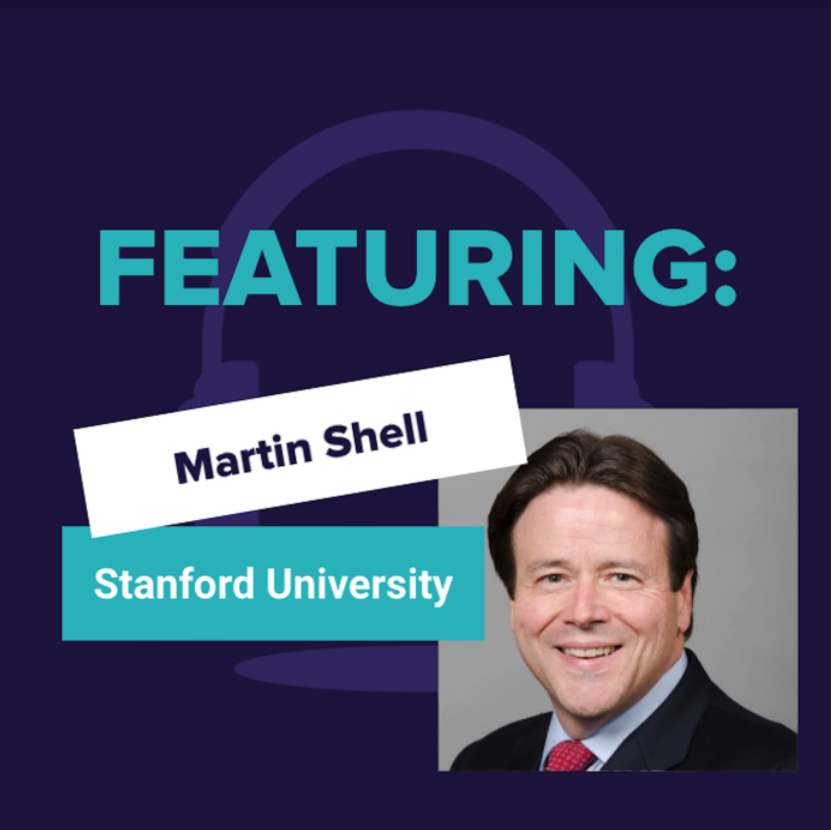On this episode of the RAISE podcast, Brent chats with an Advancement Great, Martin Shell. Martin serves as the Vice President and Chief External Relations Officer at Stanford University, and if we had a word cloud for mentions on the previous 80+ episodes of the podcast, the words “Martin” and “Shell” would be prominently displayed.
Martin and Brent discuss the opportunities and mentors that brought Martin from the Log Cabin Democrat in Conway, Arkansas; to the office of Representative Ed Bethune in DC; and eventually to one of the most successful and sophisticated advancement shops in the world at Stanford.
Catch the whole conversation below, or read on for highlights.
Episode highlights
Martin started his career working as a reporter for the Log Cabin Democrat, a local newspaper in Conway, Arkansas. He would write articles until 11am, and then head to classes at Hendrix College. Martin explains that working as a reporter taught him that copy matters, clarity matters, being concise matters, deadlines matter, and accuracy matters.
Martin reminds us that the content we produce should be tailored to our audience. That’s a challenge for a local newspaper, and an even bigger one for an institution like Stanford whose alums span decades, degrees, and the world.
When Martin left Arkansas to work on The Hill in DC, one of his mentors from the Cabin Democrat told him, “You’re leaving a place where the voltage is 110. And you’re going to a place where the voltage is 220. Some people plug into 220 and they get electrocuted. Other people plug into 220 and they never can let go.” (At the end of the day, Martin prefers 220 to 110.)
Martin talks about higher ed in the news. We read so many stories about the student debt crisis and not as many about the transformational impact of scholarships on first-generation college students. Part of this imbalance is because crises usually get good click rates. But, higher ed institutions can help this reputational issue by building better relationships with Washington, DC; by telling more stories of the magic that happens on our campuses; by pointing to studies like Raj Chetty’s on higher education and social mobility; and by embracing the hybrid learning model as a way of making degrees more affordable and accessible.
Martin tells the story of Stanford’s inception that came from love, tragedy, and entrepreneurship. Leland and Jane Stanford lost their only son to Typhoid Fever, and they established the University in his honor by donating part of the fortune the family acquired through their involvement in the Central Pacific Railroad. The inventions and entrepreneurs that have come out of Stanford are astounding, and Martin has built relationships with many of its most successful alumni.
Martin discusses the importance of playing the long game. We need to help our academic leaders realize that part of their job is to keep building on a foundation that they inherited, but that they’re not going to finish the castle under their watch. Fundraisers harvest fruit in a vineyard that they didn’t plant, and their job is to nurture that vineyard so that others can harvest fruit after they are gone.
In Martin’s words, “The American higher ed system is one of the most remarkable industries that has ever been perfected in this country, and it needs to be nourished in ways that are more important now than ever.”
More About Martin
Martin W. Shell is Stanford’s first Vice President and Chief External Relations Officer. He oversees the offices of Government Affairs, University Communications, Office of Development, Community Engagement and interim oversight of the Senior Associate Vice President for the arts. He also works closely with the Stanford Alumni Association. This new role at Stanford came about as a result of the university’s Long-Range Planning Process. It designed to better align Stanford’s communications, fundraising, government relations, community engagement and outreach with its various constituents.
Shell began at Stanford in 1998 as the Law School’s Associate Dean for External Relations later becoming Chief Operating Officer. He moved to the University Development Office in 2003 and was named vice president in 2005. During his 17 years overseeing Development as vice president and now as CERO, Stanford has raised more than $16 billion in philanthropic revenue as reported by the Council for Aid to Education.
Prior to joining Stanford, Shell held positions at the University of Pennsylvania School of Law, Temple University, Villanova University and Hendrix College. He also has served as press secretary to a U.S. Representative, and as an executive at public utility company. Shell is a trustee of Hendrix College in Conway, Arkansas. He and his wife, Lee Ann, are the parents of four adult children.
Stanford University is hiring! Want to work with Martin? Connect with him on LinkedIn, or by email at mshell@stanford.edu.
